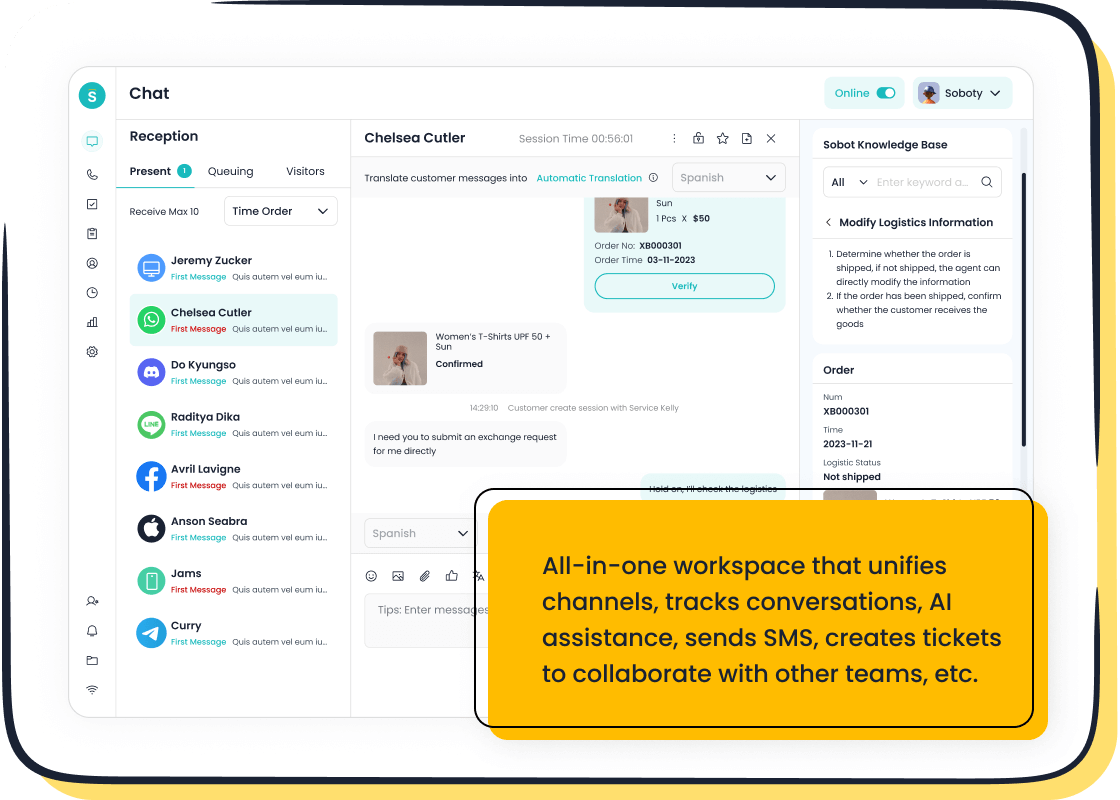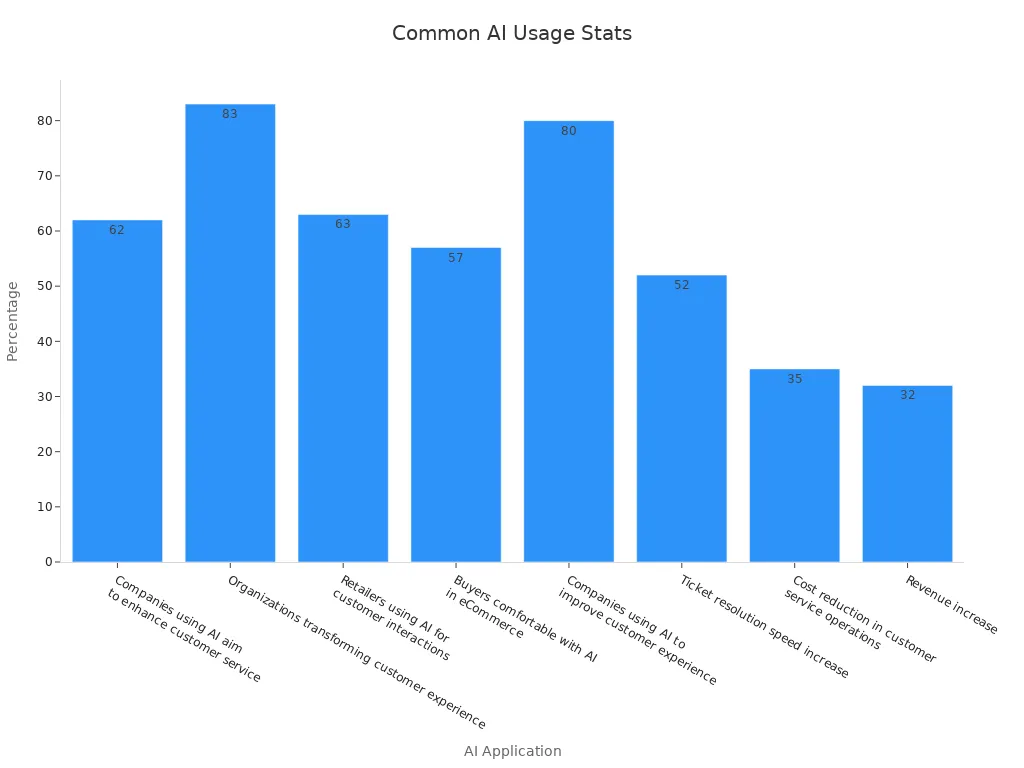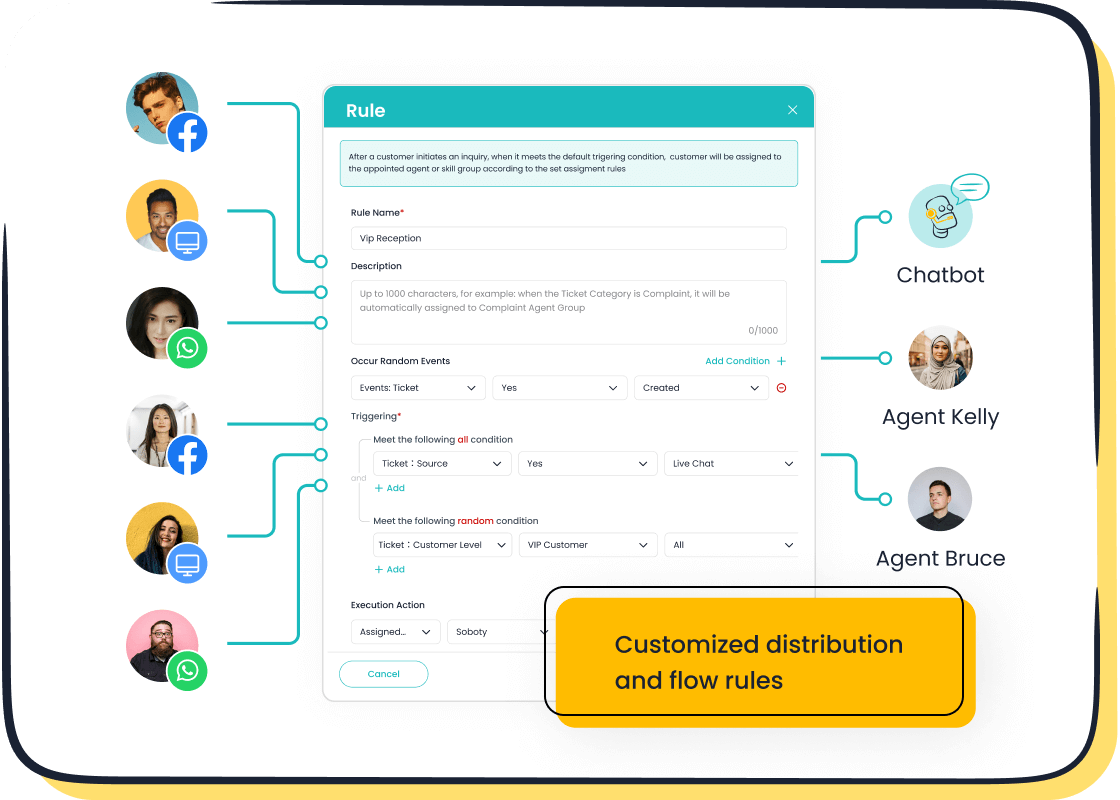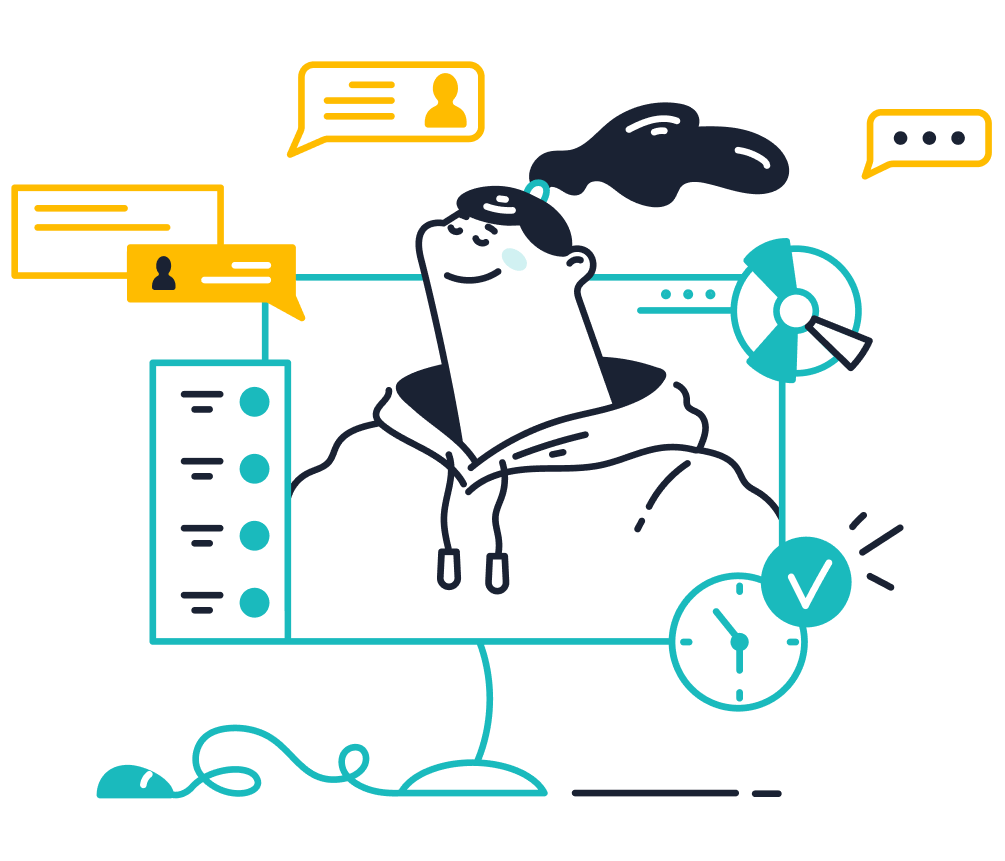Comparing AI Tools for Ecommerce Success

AI tools for ecommerce have revolutionized the industry, making operations smarter and more efficient. Did you know over 50% of e-commerce businesses now use AI to streamline their processes? Personalized product recommendations alone can drive up to 31% of site revenues. Choosing the right tool isn’t just important—it’s critical. It can save you time, boost customer engagement, and even reduce costs. Sobot, for instance, empowers businesses with its Live Chat solution, helping you connect with customers seamlessly across multiple channels.
Understanding AI Tools for Ecommerce
What are AI tools for ecommerce?
AI tools for ecommerce are software solutions that use artificial intelligence to optimize and automate various aspects of online retail. These tools analyze data, predict trends, and personalize customer experiences. Whether it's AI-powered chatbots answering queries or recommendation engines suggesting products, these tools make ecommerce smarter and more efficient.
The market for AI ecommerce software is growing rapidly. In 2022, it was valued at $5.81 billion, and by 2032, it's expected to reach $22.6 billion. This growth reflects how essential AI-driven tools have become for businesses aiming to stay competitive.
Key benefits of AI in ecommerce operations
AI brings several advantages to ecommerce. First, it enhances personalization. By analyzing customer behavior, AI can recommend products tailored to individual preferences, boosting conversion rates. For example, Stitch Fix uses AI to curate personalized clothing selections, leading to happier customers and better inventory management.
Second, AI improves efficiency. Automation reduces manual tasks, saving time and cutting costs. Chatbots, for instance, can handle repetitive queries, freeing up human agents for complex issues. Companies using AI report a 9% decrease in time spent on complaints and a 35% reduction in customer service costs.
Finally, AI provides valuable insights. Advanced analytics help you understand customer trends and make data-driven decisions. Walmart, for example, uses predictive analytics to manage inventory, resulting in cost savings and improved customer satisfaction.
Common applications: From AI customer service to marketing automation
AI tools are transforming ecommerce support and marketing. AI customer service platforms, like AI-powered chatbots, handle inquiries 24/7, ensuring quick responses and happier customers. In fact, 62% of companies adopt AI to enhance customer service, while 52% see faster ticket resolution speeds.
In marketing, AI excels at automation and hyper-personalization. It can create targeted campaigns, predict customer preferences, and even re-engage dormant users. Sephora uses AI for virtual try-ons and personalized recommendations, enhancing both engagement and sales.
AI also plays a role in content creation and management. Tools like Jasper generate high-quality and SEO-optimized content, saving time and ensuring consistency. With AI, you can focus on strategy while automation handles the details.

Top AI Tools for Ecommerce in 2025


Sobot Live Chat: Features, benefits, and ideal use cases
Sobot Live Chat is a game-changer for ecommerce businesses looking to enhance customer engagement. This platform allows you to connect with your customers instantly across multiple channels like websites, apps, and social media. With its AI-powered chatbots, you can handle repetitive queries efficiently while freeing up your team for more complex tasks.
What makes Sobot Live Chat stand out? Its built-in analytics evaluates over 150 indicators, helping you make smarter decisions. Plus, it boosts customer satisfaction with a 97% CSAT score and resolves 85% of problems on the first try. Imagine reducing inbound discussion volume by 20% and increasing positive feedback to over 96%. These numbers show how effective this tool is for improving customer experiences.
Ideal for businesses of all sizes, Sobot Live Chat works seamlessly with existing platforms. Whether you're in retail, gaming, or financial services, this tool helps you turn visitors into loyal customers.
| Feature/Benefit | Indicator/Statistic |
|---|---|
| Customer satisfaction rate | Over 95% |
| Problem resolution rate | 85% |
| Increase in sign-off rate | About 35% |
| Reduction in inbound discussion volume | 20% |
Jasper: Personalized marketing copy for ecommerce
Creating high-converting marketing copy can be time-consuming, but Jasper makes it effortless. This AI tool specializes in generating personalized content tailored to your audience. Whether you need product descriptions, email campaigns, or social media posts, Jasper delivers high-quality results in minutes.
Companies like Adidas have already seen the benefits. By using Jasper, they created product pages for 150 shoe models, significantly speeding up their content creation process. Jasper’s ability to analyze consumer data ensures your marketing campaigns hit the mark every time.
Rated 5/5 stars by over 1,000 users, Jasper is perfect for ecommerce businesses aiming to boost engagement and drive sales. It’s not just about saving time—it’s about creating content that resonates with your customers and keeps them coming back.
Lyro by Tidio: AI-powered customer support
Lyro by Tidio is another excellent tool for ecommerce businesses. This platform focuses on AI-powered customer support, ensuring your customers get quick and accurate responses 24/7. Lyro’s chatbots are designed to handle common inquiries, reducing the workload for your team and improving response times.
What sets Lyro apart is its ability to learn from past interactions. This means the more you use it, the smarter it gets. For ecommerce platforms, this translates to better customer experiences and higher satisfaction rates. If you’re looking for a reliable AI tool to enhance your customer service, Lyro is worth considering.
Dynamic Yield: Personalization for enhanced shopping experiences.
Dynamic Yield is a powerful tool that takes ecommerce personalization to the next level. It helps you create tailored shopping experiences that keep your customers engaged and coming back for more. By using AI, this platform analyzes customer behavior and delivers content, product recommendations, and offers that match individual preferences. This means every shopper feels like the experience was made just for them.
One standout example of Dynamic Yield in action is its partnership with Sweaty Betty, a popular activewear brand. Here’s how they used Dynamic Yield to boost their ecommerce success:
- Guided selling quizzes: These quizzes helped customers find the perfect products based on their preferences.
- Time-sensitive messaging: Limited-time offers encouraged quicker purchases.
- AI-powered recommendations: Personalized suggestions made shopping easier and more enjoyable.
The results? Sweaty Betty saw a 62% increase in revenue from their website recommendation quizzes. Over six months, they also experienced higher conversions and more transactions. This shows how effective personalization can be when paired with the right AI platform.
Dynamic Yield works seamlessly across platforms, whether it’s your website, mobile app, or email campaigns. It’s perfect for businesses that want to deliver personalized recommendations and improve customer satisfaction. With this tool, you can turn casual browsers into loyal buyers.
AI Wishlist: AI-generated product recommendations.
AI Wishlist is another game-changing platform for ecommerce. It uses AI to generate product recommendations that feel spot-on for your customers. By analyzing shopping habits and preferences, it suggests items that customers are most likely to love—and buy. This not only improves their experience but also boosts your sales.
The impact of AI Wishlist is backed by impressive numbers. Take a look at how it can transform your business:
| Metric | Improvement Percentage |
|---|---|
| Conversion Rates | 15-45% higher |
| Customer Purchase Amounts | Approximately 25% increase |
| Revenue Contribution | Up to 30% of total revenue |
| Upselling Revenue | 10-50% increase |
| Repeat Buyers | 56% more likely to return |
These stats highlight how AI Wishlist doesn’t just recommend products—it drives real results. Imagine your customers finding exactly what they need, every time they shop. That’s the power of AI-driven personalized recommendations.
AI Wishlist integrates smoothly with your existing platforms, making it easy to implement. Whether you’re running a small online store or a large ecommerce operation, this tool helps you deliver a better shopping experience while increasing your revenue.
How to Choose the Right AI Tool for Your Ecommerce Business
Factors to consider: Integration, scalability, and ROI
Choosing the right AI tool for your ecommerce business starts with understanding your priorities. Integration is key. You want a tool that works seamlessly with your existing platforms, whether it’s your CRM, website, or marketing software. Poor integration can lead to inefficiencies and missed opportunities. Scalability is another critical factor. As your business grows, your AI tools should handle increased data volumes and customer interactions without breaking a sweat.
ROI (Return on Investment) is equally important. Ask yourself: How much will this tool cost upfront? How soon will you see results? For example, AI-powered chatbots can reduce response times and improve customer satisfaction, directly impacting your bottom line. Establishing KPIs like increased conversion rates or reduced customer service costs can help you measure success.
| Indicator Type | Description |
|---|---|
| ROI Metrics | Evaluates the financial return on investment from AI tools, ensuring alignment with business goals. |
| Scalability Metrics | Assesses the ability of AI tools to handle increased data volumes and user demand. |
| Integration Metrics | Measures how seamlessly AI tools can integrate with existing systems and processes. |
Matching tools to your business goals and customer needs
Your business goals should guide your AI tool selection. Are you looking to improve customer engagement, streamline ecommerce support, or boost sales? Tools like Sobot Live Chat excel in AI customer service, offering omnichannel support and analytics to enhance the customer experience.
Think about your customers too. Do they value quick responses or personalized recommendations? AI tools like Dynamic Yield focus on personalization, while platforms like Jasper help you create engaging marketing content. Matching the tool’s capabilities to your goals ensures you get the most value.
AI tools also shine in predictive analytics. By analyzing customer behavior, they help you anticipate needs and deliver proactive solutions. This not only improves satisfaction but also builds loyalty.
Evaluating customer support and training options
Even the best AI tools need proper support and training. Look for platforms that offer robust customer support and ongoing training. This ensures your team can use the tool effectively without feeling overwhelmed.
User education is crucial. Tools that are easy to learn and come with clear documentation can save you time and reduce frustration. Additionally, ongoing support helps you optimize the tool post-deployment, ensuring it adapts to your evolving needs.
| Key Insight | Description |
|---|---|
| User Education | Essential for both customers and staff to ensure tools are not cumbersome or confusing. |
| Ongoing Support | Necessary to reduce customer churn and optimize AI tools post-deployment. |
As AI evolves, combining its capabilities with human expertise can transform your ecommerce strategy. The right tool, paired with proper training, can drive growth and improve your overall customer experience.
Best Practices for Implementing AI Tools in Ecommerce
Steps to integrate AI tools successfully
Integrating AI tools into your ecommerce business doesn’t have to be overwhelming. Start small and focus on manageable projects that can scale over time. For example, you could begin with AI-powered chatbots to handle repetitive queries. This approach frees up your team for more complex tasks while improving customer satisfaction.
To ensure success, create a clear strategy. Identify areas where AI can make the biggest impact, like automating order processing or optimizing product recommendations. Frameworks like Lean Six Sigma or Agile Methodology can help streamline operations and improve efficiency.
Tip: Engage experts to develop a strategic AI roadmap. They can help you create a minimum viable product (MVP) and identify revenue-generating opportunities.
Real-time analytics is another game-changer. Use AI to monitor customer behavior and adapt to shifts in demand. This helps you optimize pricing and marketing strategies, ensuring a seamless experience for your customers.
Training your team to maximize AI efficiency
Your team plays a crucial role in making AI tools work effectively. Training is essential to ensure everyone understands how to use these platforms. Start by setting clear KPIs to measure the impact of training, such as session completion rates or quiz scores.
Upskilling your team is key. Focus on employees who show interest in AI and provide them with resources to deepen their knowledge. Continuous learning ensures your team stays ahead of the curve and maximizes the benefits of AI tools.
Organizations that prioritize training often see significant results. For instance, companies using robotic process automation (RPA) report cost reductions of up to 40% and fewer errors. This highlights how training can improve efficiency and reduce operational risks.
Note: Generative AI tools require a clear integration strategy. Make sure your team knows how to incorporate them into daily operations for maximum impact.
Monitoring and optimizing AI performance over time
AI tools aren’t a “set it and forget it” solution. Regular monitoring ensures they continue to deliver value. Use big data analytics to track sales, inventory, and marketing performance in real-time. This helps you identify trends and make informed decisions.
Predictive analytics is another powerful technique. By analyzing historical data, AI can anticipate fluctuations in demand, helping you avoid stockouts or overstocking. This not only improves profitability but also enhances customer satisfaction.
AI algorithms can also uncover patterns in customer behavior. Use these insights to refine your strategies and improve your ecommerce operations. For example, optimizing product recommendations based on past purchases can boost retention rates and drive sales.
Tip: Schedule regular reviews to evaluate AI performance. Look for areas where adjustments can improve efficiency or customer engagement.
Future Trends in Ecommerce AI

Emerging technologies shaping ecommerce AI
The future of ecommerce is brimming with exciting possibilities, thanks to emerging AI technologies. These innovations are reshaping how businesses interact with customers and manage operations. Here’s what you can expect:
- Personalization: AI tools will make customer interactions more relevant, fostering loyalty and boosting satisfaction.
- Immersive Shopping: Virtual and augmented reality will let customers experience products online as if they were in a store.
- Mobile Commerce: With mobile devices dominating, optimizing ecommerce platforms for mobile users will become essential.
- AI in Customer Service: Chatbots will handle complex queries, ensuring faster and more efficient support.
- AI Advertising: Campaigns will become smarter, targeting the right audience with minimal effort.
- AI-Powered Inventory Management: Stockouts and waste will decrease as AI optimizes inventory levels.
- Predictive Analytics: Businesses will anticipate customer needs and trends, leading to smarter strategies.
These technologies aren’t just futuristic—they’re already making waves. For instance, visual search has increased digital commerce conversion rates by 30%, while chatbots have saved businesses $11 billion in customer service costs.
Predictions for AI’s role in ecommerce by 2030
By 2030, AI will be at the heart of ecommerce platforms, driving innovation and efficiency. Here’s what you can look forward to:
- Hyper-Personalization: AI will analyze data to create shopping experiences tailored to each customer.
- Real-Time Customer Service: AI tools will provide instant support, improving satisfaction and loyalty.
- Predictive Intelligence: Retailers will forecast demand and consumer behavior with unmatched accuracy.
These advancements will transform how you shop and sell. Imagine platforms that know what your customers want before they do or tools that adjust inventory in real time to meet demand. AI’s role will go beyond automation—it’ll redefine the entire ecommerce landscape.
Opportunities for businesses to stay ahead of the curve
To stay competitive, you need to embrace AI-driven opportunities. Here are some key areas to focus on:
| Trend/Opportunity | Description |
|---|---|
| Voice-Assisted Shopping | Use AI-powered voice assistants for interactive shopping experiences. |
| Personalized Recommendations | Leverage AI algorithms to suggest products tailored to customer preferences. |
| Visual Search Capability | Enable customers to find products using images for a seamless experience. |
| Predictive Analytics for Inventory Management | Forecast demand and optimize stock levels to reduce costs. |
| Sustainable eCommerce Practices | Use AI to minimize waste and appeal to eco-conscious shoppers. |
AI also opens doors to new markets. By analyzing local consumer behavior, you can adapt your strategies and expand globally. Predictive modeling will help you anticipate customer needs, keeping you one step ahead. The key is to act now. Start integrating AI into your platforms to enhance engagement, improve retention, and drive growth.
AI tools have become essential for ecommerce success. They simplify operations, enhance customer experiences, and drive growth. But choosing the right tool isn’t just about features—it’s about aligning with your business goals.
To make the best choice, you should:
- Stay informed about the latest AI trends.
- Identify your specific needs and objectives.
- Regularly assess how well your tools perform.
The future of AI in ecommerce looks bright. It’s not just about automation anymore. It’s about creating content that resonates, predicting customer needs, and building lasting relationships. By embracing these tools now, you’re setting your business up for long-term success.
FAQ
What are the key benefits of using AI tools in ecommerce?
AI tools help you save time, reduce costs, and improve customer satisfaction. They automate repetitive tasks, provide personalized recommendations, and analyze data for smarter decisions. For example, tools like Sobot Live Chat boost efficiency and help you engage customers across multiple channels.
How do I know which AI tool is right for my business?
Start by identifying your goals. Do you want better customer service, personalized marketing, or smarter inventory management? Look for tools that align with your needs. For instance, Sobot Live Chat is perfect for businesses aiming to improve customer engagement and streamline support.
Can AI tools integrate with my existing systems?
Yes, most AI tools, including Sobot Live Chat, offer seamless integration with platforms like CRMs, websites, and social media. This ensures smooth operations and better data management, helping you deliver a unified customer experience without disrupting your current setup.
Are AI tools expensive to implement?
Not necessarily! Many AI tools offer scalable pricing plans, so you can start small and expand as your business grows. For example, Sobot Live Chat provides a free trial, letting you test its features before committing to a plan.
How can AI improve customer satisfaction?
AI tools like chatbots provide instant responses, reducing wait times. They also personalize interactions by analyzing customer data. For example, Sobot Live Chat uses AI to segment customers and offer tailored solutions, leading to higher satisfaction rates and stronger loyalty.
See Also
Best 10 Live Chat Solutions: Shopify Compared to Rivals
Leading 10 AI Solutions for Enterprise Call Centers
Evaluating AI Solutions for Enterprise Call Centers